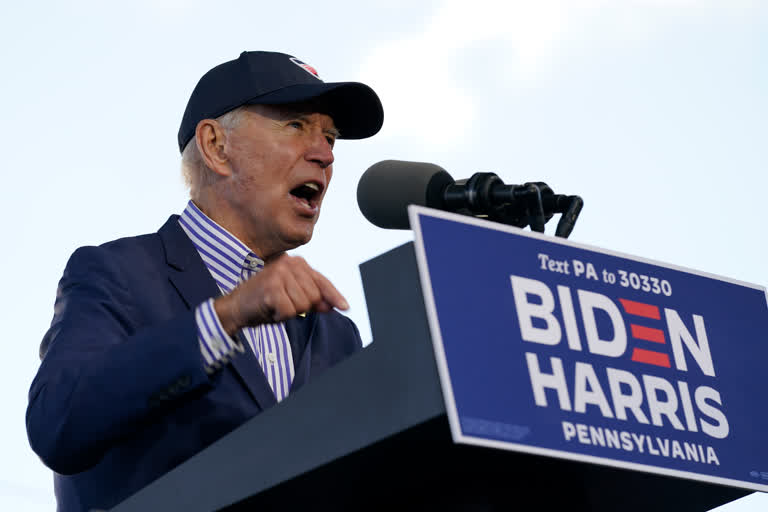Washington: Presidential politics move fast. What we're watching heading into the final full week of the 2020 campaign:
Days to the general election: 8
THE NARRATIVE
Welcome to the final full week of the election. Anxiety on both sides is spiking with so much uncertainty heading into an Election Day like no other.
The coronavirus pandemic is raging again, raising serious health concerns for those who want to vote in person. Each state has its own inconsistent and confusing patchwork of ballot access laws that raise the prospect of intentional or unintentional voter suppression. And Russia and Iran are back actively interfering in the election's closing days.
On paper, Democrat Joe Biden continues to lead President Donald Trump by a significant margin nationally, but polling suggests the race is tight in key battlegrounds like Florida, Arizona and North Carolina. Some Democrats are worried that Trump's toned-down debate performance last week could push the race closer.
Meanwhile, Trump is racing across America to reach as many voters as possible — the pandemic and public health guidance notwithstanding — while Biden sticks close to home, relying on surrogates like former President Barack Obama to energize targeted groups of Democratic voters.
THE BIG QUESTIONS
Is Biden remaking the Democratic coalition?
If Trump loses, it will be because an unlikely coalition of voters has mobilized against him.
The coalition could have more to do with Trump than Biden, but a reshuffling of voter preferences of this scope could spell trouble for Trump's Republican Party well beyond 2020. Democrats already had a major advantage among women, people of color and young voters. Their political prospects would improve dramatically if they could maintain their strength with the new groups — especially older voters, who show up to vote far more than other parts of the traditional Democratic base.
How much did Trump help himself in the debate?
Read also: US election 2020: What's an electoral college?
The reviews were mixed after last week's final debate, but the expectations for Trump were extremely low, and the president likely exceeded those expectations simply by following the rules and treating the other participants with respect. A new batch of polling will come out early this week revealing whether the debate changed many minds.
We're particularly interested in whether Biden's comments about transitioning away from the oil industry may have hurt him in a state like Pennsylvania. Biden walked back the comment immediately after the debate, explaining that he favors transitioning away from federal subsidies for oil companies — not the oil industry itself.
Read also: Biden holds cash advantage against Trump
We're skeptical that a debate, even with Biden's comment, can change the trajectory of an election so late in the game, but if Trump ends up winning, the debate will be remembered as a significant moment.
Are we headed toward a record turnout?
More than 58 million votes have already been cast in the 2020 election, according to the U.S. Election Project. That is more than 40% of the total votes cast four years ago and puts the nation on pace to break a record on overall turnout.
It's possible, if not likely, that more than 150 million people will ultimately cast ballots in the 2020 general election, which would exceed the highest voting rate in more than a century.
Given uncertainty related to the pandemic, it's too early to draw definite conclusions based on the soaring early vote totals. So far, however, Democrats have a major advantage. Overall, 13.1 million Democrats have cast ballots compared with just 7.4 million Republicans in states that record party registrations.
Notably, Republicans had a narrow lead of less than 150,000 votes for in-person early voting, but Democrats have cast 5.8 million more early mail votes.
Stepping back, higher-turnout elections typically end up being good news for Democrats. Nothing is typical about voting patterns in the Trump era, however. The president's popularity among lower-educated white voters is a major wildcard.
How narrow is the president's path to victory?
Trump is behind with eight days to go. But the president still has a path to reelection. He also has history on his side: Not since 1992 has an incumbent president failed to win a second term.
Trump will win if he holds the Sunbelt — specifically Florida and Arizona — and carries North Carolina and just one of the big three in the Democratic "blue wall" he won in 2016: Pennsylvania, Michigan and Wisconsin. Trump is also spending real money to advertise in the expansion states of Minnesota and New Hampshire over the next week.
Biden's path to the presidency is much wider. If he wins Florida alone, for example, Trump is effectively finished. The Democrat's chances will also increase significantly if he can pick up North Carolina, Arizona or Georgia, where he'll campaign on Tuesday. Biden is also within striking distance in Ohio and Iowa, two states Democrats lost by almost double digits four years ago.
But even if Biden loses every one of the aforementioned six states, he can still defeat Trump by reclaiming Michigan, Pennsylvania and Wisconsin.
Biden has a highway of possibilities. Trump's path is incredibly narrow, but it exists.
THE FINAL THOUGHT
We already know that most voters don't trust Trump on the coronavirus, but any credibility the Republican president had left on the subject took another hit over the weekend as a new outbreak swept through the office of the vice president.
There is no good time for something like this, but it comes a week before the election as Trump insists that the pandemic is improving. That's simply not true by any objective measure.
AP




